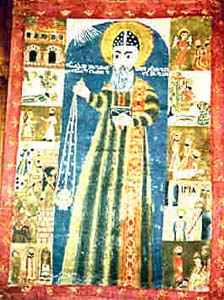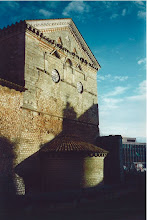Faith of the Fathers - Upon this Rock

Exterior of Baptistery of St. John, Poitiers, France, dating from 4th Cent., photo © 1995 by me
A belief that the Son of God is Son in name only and not in nature, is not the faith of the Gospels and of the Apostles. If this be a mere title, to which adoption is His only claim; if He be not the Son in virtue of having proceeded forth from God, whence, I ask, was it that the blessed Simon Bar-Jona confessed to Him, Thou art the Christ, the Son of the living God [St. Matt. xvi. 16.] ? Because He shared with all mankind the power of being born as one of the sons of God through the sacrament of regeneration? If Christ be the Son of God only in this titular way, what was the revelation made to Peter, not by flesh and blood, but by the Father in heaven? What praise could he deserve for making a declaration which was universally applicable? What credit was due to Him for stating a fact of general knowledge? If He be Son by adoption, wherein lay the blessedness of Peter’s confession, which offered a tribute to the Son to which, in that case, He had no more title than any member of the company of saints? The Apostle’s faith penetrates into a region closed to human reasoning. He had, no doubt, often heard, He that receiveth you receiveth Me, and He that receiveth Me receiveth Him that sent Me [St. Matt. x. 40. ]. Hence he knew well that Christ had been sent; he had heard Him, Whom he knew to have been sent, making the declaration, All things are delivered unto Me of the Father, and no one knoweth the Son but the Father, neither knoweth any one the Father save the Son [St. Matt. xi. 27.]. What then is this truth, which the Father now reveals to Peter, which receives the praise of a blessed confession? It cannot have been that the names of ‘Father’ and ‘Son’ were novel to him; he had heard them often. Yet he speaks words which the tongue of man had never framed before:—Thou art the Christ, the Son of the living God. For though Christ, while dwelling in the body, had avowed Himself to be the Son of God, yet now for the first time the Apostle’s faith had recognised in Him the presence of the Divine nature. Peter is praised not merely for his tribute of adoration, but for his recognition of the mysterious truth; for confessing not Christ only, but Christ the Son of God. It would clearly have sufficed for a payment of reverence, had he said, Thou art the Christ, and nothing more. But it would have been a hollow confession, had Peter only hailed Him as Christ, without confessing Him the Son of God. And so his words Thou art [cf. Exodus iii. 14.] declare that what is asserted of Him is strictly and exactly true to His nature. Next, the Father’s utterance, This is My Son, had revealed to Peter that he must confess Thou art the Son of God, for in the words This is, God the Revealer points Him out, and the response, Thou art, is the believer’s welcome to the truth. And this is the rock of confession whereon the Church is built. But the perceptive faculties of flesh and blood cannot attain to the recognition and confession of this truth. It is a mystery, Divinely revealed, that Christ must be not only named, but believed, the Son of God. Was it only the Divine name; was it not rather the Divine nature that was revealed to Peter? If it were the name, he had heard it often from the Lord, proclaiming Himself the Son of God. What honour, then, did he deserve for announcing the name? No; it was not the name; it was the nature, for the name had been repeatedly proclaimed.
This faith it is which is the foundation of the Church; through this faith the gates of hell cannot prevail against her. This is the faith which has the keys of the kingdom of heaven. Whatsoever this faith shall have loosed or bound on earth shall be loosed or bound in heaven. This faith is the Father’s gift by revelation; even the knowledge that we must not imagine a false Christ, a creature made out of nothing, but must confess Him the Son of God, truly possessed of the Divine nature. What blasphemous madness and pitiful folly is it, that will not heed the venerable age and faith of that blessed martyr, Peter himself, for whom the Father was prayed that his faith might not fail in temptation; who twice repeated the declaration of love for God that was demanded of him, and was grieved that he was tested by a third renewal of the question, as though it were a doubtful and wavering devotion, and then, because this third trial had cleansed him of his infirmities, had the reward of hearing the Lord’s commission, Feed My sheep, a third time repeated; who, when all the Apostles were silent, alone recognised by the Father’s revelation the Son of God, and won the pre-eminence of a glory beyond the reach of human frailty by his confession of his blissful faith! What are the conclusions forced upon us by the study of his words? He confessed that Christ is the Son of God; you, lying bishop of the new apostolate, thrust upon us your modern notion that Christ is a creature, made out of nothing. What violence is this, that so distorts the glorious words? The very reason why he is blessed is that he confessed the Son of God. This is the Father’s revelation, this the foundation of the Church, this the assurance of her permanence. Hence has she the keys of the kingdom of heaven, hence judgment in heaven and judgment on earth. Through revelation Peter learnt the mystery hidden from the beginning of the world, proclaimed the faith, published the Divine nature, confessed the Son of God. He who would deny all this truth and confess Christ a creature, must first deny the apostleship of Peter, his faith, his blessedness, his episcopate, his martyrdom. And when he has done all this, he must learn that he has severed himself from Christ; for it was by confessing Him that Peter won these glories.
Do you think, wretched heretic of today, that Peter would have been the more blessed now, if he had said, ‘Thou art Christ, God’s perfect creature, His handiwork, though excelling all His other works. Thy beginning was from nothing, and through the goodness of God, Who alone is good, the name of Son has been given Thee by adoption, although in fact Thou wast not born from God?’ What answer, think you, would have been given to such words as these, when this same Peter’s reply to the announcement of the Passion, Be it far from Thee, Lord; this shall not be, was rebuked with, Get thee behind Me, Satan, thou art an offence unto Me [St. Matt. xvi. 22, 23.]? Yet Peter could plead his human ignorance in extenuation of his guilt, for as yet the Father had not revealed all the mystery of the Passion; still, mere defect of faith was visited with this stern condemnation. Now, why was it that the Father did not reveal to Peter your true confession, this faith in an adopted creature? I fancy that God must have grudged him the knowledge of the truth; that He wanted to postpone it to a later age, and keep it as a novelty for your modern preachers. Yes; you may have a change of faith, if the keys of heaven are changed. You may have a change of faith, if there is a change in that Church against which the gates of hell shall not prevail. You may have a change of faith, if there shall be a fresh apostolate, binding and loosing in heaven what it has bound and loosed on earth. You may have a change of faith, if another Christ the Son of God, beside the true Christ, shall be preached. But if that faith which confesses Christ as the Son of God, and that faith only, received in Peter’s person every accumulated blessing, then perforce the faith which proclaims Him a creature, made out of nothing, holds not the keys of the Church and is a stranger to the apostolic faith and power. It is neither the Church’s faith, nor is it Christ’s.
St. Hilary of Poitiers (c. 355 AD) [bold emphasis mine].





